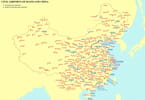Uganda Wildlife Authority Executive Director Dr. Andrew Seguya, together with colleagues from the other nearly 30 African countries seeking a greater protective status for their elephant populations, lobbied the European Union last week to help them lift the dual classification of elephant – some Southern African countries are still permitted to list their elephant under CITES Appendix II – and accord them a continent-wide Appendix I status.
“The African elephant is a single species and the CITES listing needs to reflect that” he said in his presentation as Uganda alongside like-minded countries such as Rwanda, Kenya, Eritrea, Ethiopia and South Sudan from the Eastern part of Africa seeks support ahead of the CITES 17th Conference of Parties coming up on Johannesburg from September 24 to October 5.
Host country South Africa, together with several neighbours, has come under intense pressure and been singled out for harsh critique over having their elephant on Appendix II and wanting to keep them there, setting the stage for some heated exchanges as the Elephant Coalition, together with much of the rest of the world, now forms a united front against the four and the key consumer countries of blood ivory, in particular China.
Dr. Seguya then went on to say: ‘We call on the EU to follow through on their commitment for a total ban on ivory trade and support an African solution to an African problem’.
That single African solution however seems as distant as ever as countries like Namibia, Botswana and Zimbabwe have all already said they prefer the status quo since their elephant populations are still growing inspite of an upsurge in poaching in the recent past.
More than 100.000 elephant have been killed over the past three to four years with the slaughter most intense in Tanzania, where the former regime did little of substance to stem the tide and stood by almost idle until new President John Magufuli after his election names poaching as one of the key reasons for Tanzania’s battered conservation reputation abroad and vowed to bring the culprits to book, no matter how highly placed or previously protected they were.
Kenya has comparably low poaching numbers of elephant while Uganda’s figures are, due to strict enforcement policies and threats to shoot poachers on sight are even lower with Rwanda not having had an elephant poached for some years now, again due to strict anti poaching operations.
‘Let’s not forget, most of our tourism industry in East Africa is still wildlife and nature based. Unless we protect our resources and assets, through anti poaching operations and environmental protection of lakes, rivers and forests, we lose our main ingredients of success. No one will come to see our parks if they are empty and if our rivers and lakes are polluted and stink. No one will come to see Maramagambo, Kibale or Mabira when all left of our forests are tree stumps. CITES 2017 is our chance to turn things around, expose countries engaged in illegal trade and broadly expand the status of protection not just for elephant but also for our national bird the Crested Crane for instance. That one in particular has fast declining populations due to loss of habitat.
It is time to act, it is time for a global coalition to fight for what is right’ added another Ugandan conservation source when asked to comment on the country’s stand taken in Brussels and ahead of the CITES meeting in Johannesburg.
WHAT TO TAKE AWAY FROM THIS ARTICLE:
- Host country South Africa, together with several neighbours, has come under intense pressure and been singled out for harsh critique over having their elephant on Appendix II and wanting to keep them there, setting the stage for some heated exchanges as the Elephant Coalition, together with much of the rest of the world, now forms a united front against the four and the key consumer countries of blood ivory, in particular China.
- 000 elephant have been killed over the past three to four years with the slaughter most intense in Tanzania, where the former regime did little of substance to stem the tide and stood by almost idle until new President John Magufuli after his election names poaching as one of the key reasons for Tanzania’s battered conservation reputation abroad and vowed to bring the culprits to book, no matter how highly placed or previously protected they were.
- ‘We call on the EU to follow through on their commitment for a total ban on ivory trade and support an African solution to an African problem’.





















